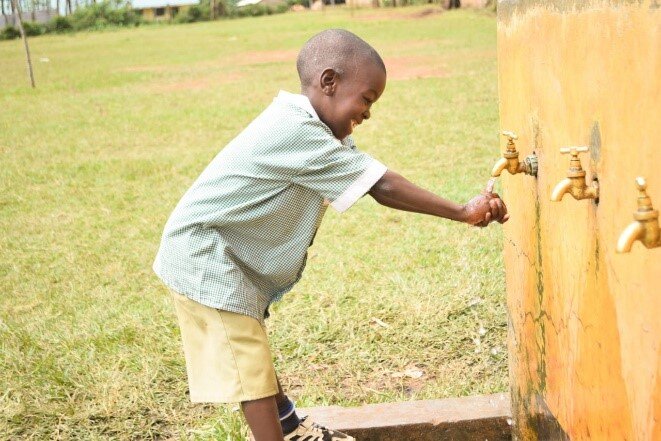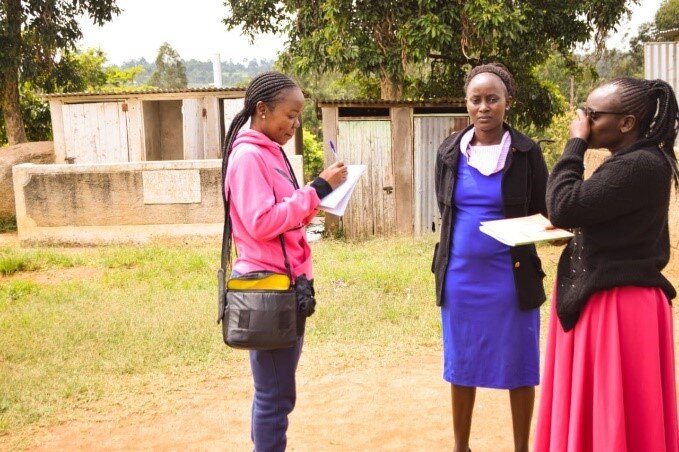By Nancy Itambo | Project Officer
1.0: ACTIVITY PROCEEDINGS
The Millennium Development Goals emphasize the importance of universal primary education and access to safe drinking water and sanitation. By combining these goals; water, sanitation, and hygiene (WASH) in Schools decreases female absenteeism by 58%, reduces the risk of diarrheal disease by 66% in students, and increase use of household water treatment in surrounding communities.
Effective WASH in schools improves health, boosts attendance and promotes gender equity and equality. Stereotypes are challenged through engaging boys and girls in WASH activities in schools, and through providing leadership opportunities for girls in student WASH Health Clubs. Access to gender segregated, private and girl-friendly WASH facilities, paired with improved knowledge on sexual and reproductive health, breaks down the stigma and taboos related to menstrual hygiene, and establishes an enabling environment for good menstrual hygiene management. Engaging with boys also promotes positive masculinities related to WASH roles in schools.
WE REACH works with schools to improve WASH through capacity building approach and risk-based tools based in an ‘Assess- Plan-Act-Monitor’ cycle. Our enabling approach focuses on what the schools can learn and be able to do themselves, rather than just supplying facilities and services. It provides the schools the opportunity to be active actors in the improvement of their WASH infrastructure and services. We also work with the Ministries of Education (MOE) and Health (MOH) authorities to strengthen implementation of WASH in Schools standards and policy.
On a recent visit to the partner schools, we observed how the WASH Program and our training at the beginning of the year have helped to boost Students’ Teachers and Head Teachers drive to increase their uptake of health messages touching on water sanitation and hygiene, and on other issues pertaining the promotion of human and environmental health. It is evident that the schools are concerned with the general welfare of its students and are committed to shaping each student to become a responsible citizen, including when it comes to their health. The schools administration seriously took in every detail covered during the training at the beginning of the year and are applying each practice to the latter. Walking around the schools, we noticed that the schools’ compound and both the students’ and ‘staff members’ buildings are very tidy. According to the Teacher Health Champion and Health Club Members of Emakhwale Primary School, this level of cleanliness has definitely contributed to the prevention of diseases at their school. The highlight of our visit was majority of the schools are reporting early and significant reductions in absenteeism since the inception of the WASH Programme. The impact of the School Health Clubs particularly on school hygiene, has been immediate and impressive.Paul Ochanda, a student at Mwichina Primary School who is a member of the Health Club, claims that the activities taught during the health club meetings are both informative and, most importantly, fun. Benson Wabuyabo Head Teacher Khaunga Primary School said “children have adopted a simple and automatic practice of hand washing as a responsibility without supervision. Health Club members guide the school and monitor regular cleaning of the latrines and filling of the hand washing units.”
Most of the head teachers have done a decent job of encouraging WASH at the partner schools. They had used a number of initiatives to improve WASH promotion in their respective schools. These strategies included the mobilization of infrastructure, as we saw in Emakhwale Shamberere and Mahola Primary Schools, where after receiving training on their roles and responsibilities from WE REACH at the beginning of the year, the head teachers wrote proposals to the office of the local member of parliament and successfully the proposals resulted in the construction of 6 doors exhaustible pit latrines funded by NG-CDF Mumias East. In Epanja, Maraba and Khaunga Primary Schools, members of the school health clubs took part in the cost recovery planning session with their head teachers. The pupils with the support of the school teacher health champions, developed a cost recovery plan with income generating activities such as agriculture. They have planted vegetables as a result of their planning with the intention of selling them to teachers and people of the community. They hope to make money from the sales made during the first season of their vegetable growing project so that part of the money can be used to purchase supplies for liquid soap making. However, some of the head teachers had not done much to make their schools WASH friendly hence, head teachers need to spearhead the initiative by putting in proper strategies and ensuring proper supervision is carried out at the school level. During the visits, WE REACH established that Promotion of WASH in Primary Schools by the Head Teachers was facing a number of challenges such as low funding, hostile school neighbouring communities, and uncooperative parents among other issues. However majority of the targeted Head Teachers had taken every available opportunity to make their schools WASH friendly.
2.0: LESSONS LEARNT
3.0: CHALLENGES
4.0: RECOMMENDATIONS
5.0: CONCLUSION
The support WE REACH has given to the partner schools on implementation of the WASH activities has been appreciated all through by the schools administration. As schools they have undergone transformation to a great extent and it is good to observe children enjoy hand washing, decent sanitation and better hygiene practices among both pupils and teachers. WE REACH believes these activities will ultimately improve the health and learning environment in our schools, enhance performance in academics and provide better health in the communities. The WASH Programme is vital for all schools since its benefits are lasting.
Project reports on GlobalGiving are posted directly to globalgiving.org by Project Leaders as they are completed, generally every 3-4 months. To protect the integrity of these documents, GlobalGiving does not alter them; therefore you may find some language or formatting issues.
If you donate to this project or have donated to this project, you can recieve an email when this project posts a report. You can also subscribe for reports without donating.
Support this important cause by creating a personalized fundraising page.
Start a Fundraiser
